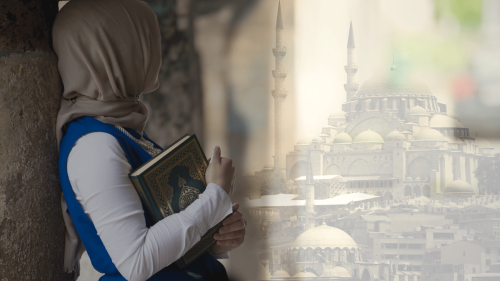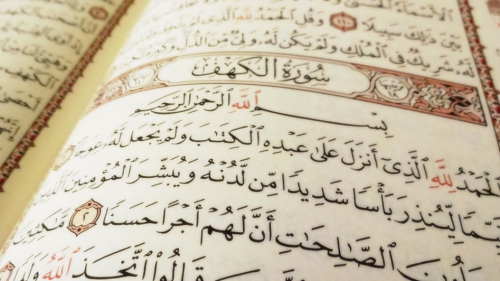IJTIHAD - Interpreting Islamic Principles

Ijtihad, the dynamic principal of Islamic Law, helps to keep law ever fresh and capable of facing the challenges of new places and times. Sometimes ijtihad requires looking afresh at Islam's primary sources, the Qur'an and Sunnah, and reinterpreting them according to new circumstances. It may, also, entail going beyond the sources and introducing new legislation under the general framework of the primary sources. The usuli scholars who deal with the methodology of Islamic law define ijtihad as: "It is the mujtahid's exertion of maximum effort in seeking knowledge of the ahkam (rules) of the Shari'ah through interpretation."
This definition implies four main principles: (1) It is the mujtahid's effort that counts; a non-mujtahid's effort is of no consequence. (2) Effort must be exerted to the ultimate limits of one's ability. (3) Effort should be directed towards the discovery of shar'i rules. (4) The method of discovery should be based in the interpretation of texts, assisted by other sources.
Ijtihad is not exclusively Islamic. Secular legislators, also, make ijtihad by striving to make laws that conform to the public policies of their societies and advance its objectives. These objectives are often enumerated in their constitutions or bills of rights. Similarly, judges make Ijtihad by interpreting the law. In doing so, they are guided by the wording of the law; the legislators' intentions found in reports and speeches; and interpretations given by other judges in similar circumstances.
The real difference between Islamic ijtihad and secular endeavors is not as much in the nature of the endeavor itself, but in its sources. A mujtahid or Muslim jurist uses revelations contained in the Qur'an and examples from the Sunnah as the main sources of guidance for lawmaking or rendering a decision. He expresses his views under the authority of the Lawgiver. Since the nature of law is religious, the mujtahid is supposed to be a person of piety (taqwa). They should, also, have a good knowledge of:
-
Arabic: Language, grammar, syntax and rhetoric.
-
Qur'an: Qur'anic principles and themes, the Makkan and Madani Surahs, asbab al-nuzul (occasions of revelation), nasikh wa mansukh (repealing and repealed rules), etc.
-
Sunnah: Prophet's traditions from authentic sources of Hadith, knowledge of isnad (chain of narration) and matn (content of text), and the critical method of authentication.
-
Ijma': Consensus of the sahabah and earlier scholars.
-
Basic objectives of the shari'ah (maqaasid): Protection of religion, life, property, mind and family.
-
Context: Situation of the time and place (wagi), and understanding of changing economic, political, and social conditions.
-
Customs and cultures of the people.
-
Aptitude to make ijtihad: Gifted with an analytical, legal mind and trained to do this type of work.
Islam is the total way of life. Muslims are obliged to live by Divine rules in every aspect of their lives. However, the actual Divine rules given in the Qur'an and the Sunnah are limited. The Qur'an has no more than 600 verses directly related to rules; there are approximately 2,000 ahadith that deal with laws. Muslims agree that the entire Qur'an is from God and is authentic. Ahadith, however, include statements that are definitely from the authority of Prophet Muhammad (salla Allahu 'alayhi wa sallam), as well as statements of questionable authenticity. Additionally, both the Qur'an and ahadith include statements that are of definite meaning and probable meanings. Thus, all statements can be divided into four categories:
-
Definite source, definite meaning
-
Definite source, probable meaning
-
Probable source, definite meaning
-
Probable source, probable meaning
The mujtahid's work is to ascertain the authenticity of the source/s and then:
-
Discover laws through interpretation of the sources.
-
Utilize analogy (qiyas) to extend laws to new cases that may be similar to cases mentioned in the sources, but where laws cannot be discovered through literal interpretation.
-
Consider istihsan or istislah (general interests of the community) and the general principles and objectives of shari'ah when extending laws to new cases not covered by the previous two methods.
Jurists go into great detail in explaining rules and limits of interpretation, analogy, istihsan and istislah. The mujtahid, whose basic purpose is to explain and articulate the rule of God (hukm shar'i) in a particular situation, takes on the very serious responsibility of explaining God's Will towards His creatures, as individuals and as communities. The mujtahid explains the hukm shar'i: "The communication from God, related to acts of subjects through a demand, option or through declaration." Here, a demand could be expressed in binding terms (as obligations or prohibitions) or in nonbinding terms that give a recommendation to do or not to do. An option could be expressed in terms of choice for commission or omission, when the act becomes permissible. Declaration indicates the cause (sabab), condition (shart) or impediment (mani) for an action.
Challenges Today. Ijtihad worked very well in the past because jurists had good knowledge of the sources and developed a thorough and comprehensive methodology of interpretation. They were also well aware of their contemporary situations. Their educational system was not bifurcated between religious and secular studies. They also enjoyed some legislative authority, where the states implemented the laws they made. The state system was not as pervasive as today; they were often free to make their own decisions and judgments.
The situation has drastically changed today. Our jurists have good knowledge of the classical sources, but their methodologies of interpretation have not been updated with new knowledge of language, logic, semantics, et cetera. Additionally, Muslim societies, by and large, lack the required freedom that scholars need in order to find resources, read, assemble, and freely debate issues of concern. Often control over freedom is not only exercised by political authorities, but also by religious establishments. The Islamic educational system has not developed. There is a large gap between religious and secular knowledge. Religious scholars are often not well aware of the socioeconomic and political conditions of their time; politicians, courts and other secular academics are not well versed in religious knowledge.
The sources and principles of Shari'ah, while enjoying the allegiance of the vast majority in Muslim societies, are not taught or applied in a cohesive, consistent or comprehensive manner. This has resulted in the existence of simultaneously running, parallel disciplines - secular and religious-that are often conflicting, rather than complimentary.
Shari'ah is not taught today as an integral part of legal learning, and it is not applied by a unified court system. Consequently, it is becoming less and less practical and dynamic; it is losing its vitality and ability to affect the lives of people and their societies. It is becoming unable to fulfill its role as a source of guidance meant to remove conflicts and improve the conditions of people.
Furthermore, Shari'ah today functions more in fatwa pronouncements than decisions of judges. Unlike judges' decisions, fatawa, given by scholars who do not have to worry about the gravity of their impact on society, tend to be idealistic and less practical. Sometimes, they even ignore the changing circumstances of the societies. Such problems will continue unless Shari'ah is incorporated into the overall legal system.
Reopening Ijtihad. Some Muslims say that the door of ijtihad was closed in the fourth century of hijrah; others disagree. Whatever position one may take, the fact is that there is a great need for the renewal of ijtihad today; ijtihad is essential for the revival of Muslim states and societies. However, the basic condition for ijtihad is freedom of expression. There cannot be true ijtihad unless scholars are free to express their opinions, and other scholars are free to critique. Freedom of expression is ingrained in the precepts and practices of ijtihad. This means that the democratization of Muslim societies and basic freedom for scholars are essential for ijtihad.
Change in the Muslim educational system is also overdue and necessary. The curricula of religious schools and seminaries should be improved. Instead of studying only one madhhab (Sunni madhahib in Sunni schools and Shi'i madhahib in Shi'i schools), all known madhahib of Sunnah and Shi'ah should be taught. Instead of teaching rulings and interpretations of the schools, the evidences and methods of interpretations should be taught. Comparative religion, modern logic, philosophy, psychology, history, economic and political theories should also be studied. Greater emphasis should be placed on the objectives of the shari'ah (maqaasid al-shari`ah). The scope of the objectives should be further elaborated and refined with the help of our ever growing knowledge and experiences, as well as the work of past scholars. Islamic schools and seminaries should pay more attention to the valuable body of Islamic literature on this subject, including the works of scholars such as Abu Mansur al-Samarqandi al-Maturidi (d. 944 CE); Abu Bakr al-Qaffal al-Shashi alShafi'i (d. 975 CE); al-Qadi Abu Bakr ibn al-Baqillani al-Basri al-Baghdadi (d. 1013 CE); Abu] Ma'ali Abdul Malik ibn Abdullah alJuwayni (d.1085 CE); Abu Hamid Muhammad al-Ghazzali (450-505 H/1058-1111 CE); Abu Bakr Muhammad b. Zakariyya al-Razi (Rhazes) (ca. 250/854-313/925 or 323/935);Abd Allah ibn Umar al Baidawi (d 1286 CE); Jamal al-Din 'Abd al-Rahim ibn al-Hasan alIsnawi (d.1370 CE); al-'Izz ibn 'Abd alSalam al-Sulami (d. 1261 CE); Ahmad b. Idnis b. 'Abd al Rahman al Sanhaji, al Bahnasi, al Qarafi (d. 684H/1268 CE); Najmuldeen Al-Tufi (d. 893); Ibn Taymiyah (1263-1328 H); Ibn al-Qayyim alJawziyya (691-751H/1292-1350 CE); Taj al-Din al-Subki (d. 1369 CE); Abu Ishaq al-Shatibi al-Maliki (d. 790H/1388 CE); Wali Allah al-Dahlawi (d. 1763 CE); Muhammad al-Shawkani (d. 1834 CE); Muhammad 'Abduh (1849-1905 CE) ; Muhammad Rashid Rida (1865-1935 CE); Muhammad Tahir ibn 'Ashur; Yusuf Ibn Muhammad Ibn Yusuf Al-Fasi (born 1530/31); Muhammad Abu Zahrah.
New Methodology. In order to make ijtihad consistent and free from personal whims, fads or pressures of the time, new usul (methodology/methodologies) of ijtihad should be developed and added to our existing heritage. While fully benefiting from the great work of our past scholars, we must also try to improve on their foundations, utilizing new knowledge and epistemology. In addition to learning from the work of the great scholars of usul, we should also pay attention to two issues in our new methodology of ijtihad.
First, ijtihad should not be used to isolate Muslims or to make them lose their identity. It should be used to promote healthy and positive interaction with the world. It should pay attention to the objectives (maqaasid) and priorities (awlawiyat) of the shari'ah. The mujtahid's objective should not be to make things too rigid, or loose, or watered down; rather, modern ijtihad should attempt to establish and promote the balanced, middle path (wasatiyah).
Second, ijtihad should be collective as much as possible. Today, several national and international fiqh councils are working in different parts of the world. They should coordinate their efforts; become better organized; and include both male and female shari'ah experts. These councils should also include as consultants, experts from the fields of medicine, astronomy, economics, social and political sciences, and law. If needed, even sympathetic and objective non-Muslim scholars and experts should be invited for consultation. The councils should not only publish their rulings, but also the evidences and methodologies for their rulings. They must strive to build consensus (ijma') as much as possible.
Ijtihad Issues. The issues that need ijtihad are many. Some of the top priorities include:
Role of Women: There is indeed a great need to review the role of women in Islam by carefully examining the original texts (nusus) and by freeing them from some cultural interpretations.
Sunnis and Shi'is: The gap between various Islamic madhahib (schools and sectarian positions) should be closed. Modern ijtihad should try to merge or bring closer various schools of fiqh of both Sunnis and Shi'is.
Spirit of Globalization: Modern ijtihad should go beyond the division of the world between Darul Islam and Darul Harb or Darul Kufr. Emphasis should be placed on one world and responsible citizenship in our global village. Ijtihad should also try to foster better relations between people of diverse faiths and cultures; it should promote dialogue of cultures and civilizations, not clash of cultures and civilizations.
Economics: There is certainly a need for radical thinking and review of Islamic economics, taking advantage of modern economic thought. Why is the Muslim world in poverty, and how can we change this trend? What ways of cooperation and collaboration with world economic bodies and forums are possible for Muslims without compromising the true and authentic Islamic values and principles?
Unity among Muslim States: Islamic political thinking and statecraft should be reviewed. How can we bring the various Muslim states together, and what new structures are needed to establish and promote political unity among Muslim states? Ethical and moral standards of the Islamic state, as well as the freedom of individuals and especially other religious minorities and their role and participation in the state should be carefully examined under the changing circumstances and times.
Muslims in Non-Muslim Countries: Ijtihad is also needed to guide almost one-third of the ummah that lives as minorities in majority non-Muslim countries. What Islamic rules and guidelines must they follow to be good citizens of their native or adopted lands, and how can they become active participants in the life and culture of these countries while not neglecting their Islamic ethical and moral values and standards?
Ijtihad in America. Muslims of America are in a unique position to contribute to ijtihad in our modern times. Our position is unique because this is the first historic situation where a very large number of Muslims from diverse ethnic, racial and religious (madhhab) backgrounds have come together and are living together. The Muslim community is a prosperous community and does not lack material resources. Despite the challenges of Islamophobia created in the aftermath of the 9/11 tragedy, the truth is that this is still the best country in which to do work and research in any field, including Islamic studies. There are those who want to keep us busy in apologetics, but we have to come out and help ourselves, help the ummah and the world at large. With our enormous resources and opportunities, we should be able to make a great difference. We need to develop institutions of learning, full time and first class Islamic seminaries, and engage our youth in mastering the Islamic disciplines, the Qur'an, sunnah, fiqh, kalam, et cetera, and help them take full advantage of their nation's world-class educational institutions. We can also engage the best minds of the Muslim world in our modern ijtihad and help develop our new methodology without being censored by political or religious establishments of the present day Muslim world.
Dr. Muzammil H. Siddiqi, vice chair of the Fiqh Council of North America and member of ISNA Shura Council, is director of The Islamic Society of Orange County, Garden Grove, CA. He is an adjunct professor of Islamic Studies and Comparative Religion at California State, Fullerton and Chapman universities.
Source: Islamic Horizons
Related Suggestions
It seems pointless discussing issues like this with you. Accusations like what you noted creates 'shiqaq'. And nowhere I said about the Prophet what you claim that I have said. I said that Islamic history became political. Rulers appointed themselves after the Prophets demise, then banned such ahadith for decades, then allowed it to suit their whims. I advised you to read such history instead of blindly following what others have reported about the Prophet. I also said refer such ahadith to the Quran and ensure they do not conflict with Quran. So, I uphold Quran above ahadith. As for prayers. The Quran states those prayers clearly. The Prophet expanded on that - jewish prayers are very similar to ours, so they were people of the book who prayed like us. Prayer is an act repeated 5 times a day by all of us. So there should be no confusion because people saw the Prophet repeat such act 5x/day. Think about this. Shiite pray with hands down and Sunni with hands crossed. If these groups can have such a difference in an act that was so obvious and was repeated by the Prophet 5x/day, then what other rubbish they have told about the Prophet. I for one do not take such ahadith as gospel for fear of becoming like Christians. I use them as a guide, no more. Never give it divinity because that would be a grave mistake. Stick to The Quran for guidance. Then know that God is closer to you than your gagular vein. Allah never leaves His servant alone. If you need a matter clarified ask HIM, if you can not find ahle aldhikr. Would Allah leave His sincere (mukhlis) servant in dispair?
I say to you and anyone who reads this: A muslims action must mirror tawheed for it is the core of Islam. Wassalam.
"The 2nd and 3rd example also show the importance of obedience to Allah and obedience to the Prophet together . Look closely at 3, Allah says... obey Allah and obey the Messenger and those in authority amongst you.. whereas He used "obey" in the case of Himself and the Messenger He was silent in the use of "obey" in the case of those in authority (imams, auliya [saints], mullahs, presidents etc) to show you that obedience to other than Allah and His Messenger is conditional. That you obey others only to the extent to which their commands conform to Allah's and His Messenger's."
Numerous verses abound in the Quran to show that TOTAL obedience; note the emphacies on TOTAL always, [as obedience is equally due to parents, auliya'al Allah, leaders etc], is due ONLY to Allah and His Messenger Muhammad (SAW). And 'm sure Ahmed you are not saying that the Prophet did not utter anything except the words in the Quran during his life time. I have already gave you the example on the explanation of the five daily prayers. No where it was explained in details (as we are doing them) in the Quran. Sum total of these arguments is also with Allah's saying. ....wa anzalna ilaikaz zikara litubayyina linnas..and we have sent down to thee (o' Muhammad) the message (Quran) that you may EXPLAIN CLEARLY to men...
Sadaqal Allahul 'Azim.
How did the Prophet (SAW) explain the message to us Ahmed? Through authentic AHADITH is the answer.
Goodbye.
What you say is absolutely right in that whatever the prophet said was to be followed when he was alive and people heard him and obeyed him. I have no doubt that any Muslim today would give their life to have been a companion of the Prophet. The stuff that was absolute was noted down and became our Quran. The Prophet warned us to follow The Quran and his sunna which means his way. The way he lived as an example of The Perfect man. Today we yearn for him but we have to live with Quran, since whatever was written about whatever the Prophet said has truly divided us. Take a look and see for yourself. Who is right? Refer it to Quran which commands us to hang on to the rope of Allah and not be divided. The Prophet gave his life to unite the Arabs, then Christians and Jews, then Romans and Persians, etc. So, Allah's Unity is above ALL Existance. There is not a verse in Quran that contradicts Allah's Unity.
So when a group come up and for personal gain they report what the Prophet said, are we to follow these blindly. Notice there is no hadith book written by the Prophet himself. Always someone said that someone has said that someone has heard that the Prophet said xyz. We already know many ahadith are considered weak, or very weak yet still report them.
What I say let the Quran be your arbiterer in the absence of the Prophet. Yet we learn from all creatures, for they all carry signs from Allah, yet Allah is The Absolute. Peace brother.
Let me see if I can educate you or at least prompt your intelligence;
Just like the above verses show the importance and superiority of the Qur'an over all scriptures so also does verses like;
..wa in tudihu tahtaduu.. if you follow him (the Messenger Muhammad [SAW]) you will be in true guidance..
...wa ma atakumur rasulu fakhuzuhu wa ma nahakum 'anhu fantahu..whatever the Messenger (Muhammad [SAW]) gives you hold on to it, and whatever he forbids for you keep away....
shows the superiority of following the Prophet (SAW) only! Next question, a contradiction? Certainly NOT. Why?
We look at verses like;
1. ....wal Allahu wa rasuluhu ahaqqu an yurduhu....
2. wa adiul Allah wa adiu rasul wa ahzaru...
3. ...adiul Allah wa adiur rasul wa ulil amri minkum...
Look at 1. two entities Allah mentioned, Allah and the Messenger; but in His wisdom He now did not qualify them with second person plural "huma" but first person singular "hu". ie the verse should have read wal Allahu wa rasuluhu ahaqqu an yurduhuma.. to indicate "two" But Allah wants us to know that obeying Allah and obeying the Messenger are one and the same thing so he used "an yurduhu" What we derive from this is that if you follow Allah at the expense of the Prophet you fail, likewise follow the Messenger only (as some sunnis use to do) and forget Allah some how, you fail also. Therefore, submit to Allah follow His commandments in the Quran and obey (total obedience) the Messenger you be safe and you are on true guidance.
The 2nd and 3rd example also show the importance of obedience to Allah and obedience to the Prophet together . Look closely at 3, Allah says... obey Allah and obey the Messenger and those in authority amongst you.. whereas He used
Time for Peace
In the name of Allah, the Most Great, let us sort out into groups to see where we have done good and not so good.
In these groups sorted out let us learn Family and Community building skills.
Lets us find paths for forgiveness and an end to the bitterness of war on many levels.
Let us strive to learn skills toward becoming a better Person, a better Husband, a better Wife, a better Mother, a better Father, a better Brother, a better Sister and better Neighbors and Friends.
Let us strive to build One Nation in Islam. As the word Islam means submission or cooperation this is something we all do in degrees, some 14%, 35%, 46%, 68%, 72%, 87%, 91%, 99.9% making us all technically Muslims and all part of one Ummah.
In this all religions are an expression of the evolution of Islam and each are valid paths from which to choose and even the path with no religion is a valid path as Allah guides whom he will to the straight path.
It is time to work together as one Ummah on the personal and world issues and support and one another on the path to becoming a better Person, a better Community, a better Nation and a better World.
Inshallah we shall have a great and wonderful sorting out into groups to learn the skills we need to bring light and wisdom to the world.
Some groups I might recommend are parenting skills, relationship skills, anger management, stress management, good communications and conflict resolution skills to name a few.
Mashallah bless all who for the grace of Allah participate in this great ongoing event!
Saturday, May 05, 2007
Anne Marie Elderkin Habibi
***
We can accomplish our goals and dreams one step at a time, so don't give up there is hope.
This is my Ijtihad
"Sayings (authentic) of the Prophet (SAW) are part and parcel of the Quran." Where does it say so in Quran. Q45:6 is what it says about hadith!
You seem to have missed the point that Quran is a higher authority than hadith which was written by people hundred years after Prophet died. Also hadith was prohibited by successive khailfahs until it bacame highly political. Abu Huraira was accused as a liar by Omar and Aisha. He wrote over 5000 hadith when he only spent 2 years with the Prophet. Most of his ahadith were written when he took residence in Muawiya's palace to endear himself whilst we all know what was Muawiyah's intentions. Please read your own history. Most Arabs acknowledge the years of Muawiyah as dark ages of Islamic histroy. Also the fact that many of the hadith writers said exactly what Jaffar had said- at least tow were his students. That if what is said does not conform to Quran then do not follow it. How can you even consider Hadith to be comparable to Quran in value. Please read Q45:6.
It is required from any Muslim to look upon another Muslim as a brother. How can you accuse Shia of kufr when they pray 5x, have the same Quran and believe in Allah and the Prophet?
As for 'shiqaq' you mentioned. I could easily accuse you of the same!! because of your attitude towards other Muslims.
Truth is that each madhab believe they are the chosen right. Same with every sect of Christians and Jews. So, who is truly right? Do you make this judgement or leave it to Allah, as He has asked you many times in Quran and even told Mohammad to leave judgement to Allah, since he was only basharun mithlukum. Insofar as he was 'wahy", well Mohammad gave us the Quran and it is Allah's words and it shall stay without change. Yet in it Allah admonishes Mohammad for irring. Q66.1, 18:110, 80:1.
How can we invite others to this beautiful deen when we can not even accept our own?
I have read other writings by this author. He euphemistically espouses alterations to Islam so that we will fashion an "American Islam". There are others like him in Europe who epouse a "European Islam". The purpose of this so-called modern Ijtihad is to open a gradual incrementalism so that a century later, Islam has been turned to out and out Kufr from within. People like these are the worst of Allah's creation because a non-believer is open about his non-belief but a hypocrite trys to destroy from within by using fair-seeming words and imagery familiar to Muslims.
Quran 15:39,40 (Iblis) said: "O my Lord! because Thou hast put me in the wrong, I will make (wrong) fair-seeming to them on the earth, and I will put them all in the wrong,- "Except Thy servants among them, sincere and purified (by Thy Grace)."
Watch out for this guy -> Dr. Muzammil H. Siddiqi. He euphemistically espouses alterations to Islam so that we will fashion an "American Islam". There are others like him in Europe who epouse a "European Islam". The purpose of this so-called modern Ijtihad is to open a gradual incrementalism so that a century later, Islam has been turned to out and out Kufr from within. People like these are the worst of Allah's creation because a non-believer is open about his non-belief but a hypocrite trys to destroy from within by using fair-seeming words and imagery familiar to Muslims.
Quran 15:39,40 (Iblis) said: "O my Lord! because Thou hast put me in the wrong, I will make (wrong) fair-seeming to them on the earth, and I will put them all in the wrong,- "Except Thy servants among them, sincere and purified (by Thy Grace)."
Malik born year 93 Hijra.
Shafi'i born year 150 Hijra.
Ibn Hanbal bron year 164 Hijra.
Abu Hanifa born yezr 182 Hijra.
The first one was a student of Imam Jafar Al-Sadiq (a Shiah imam). The second was very much influenced by Imam Jafar's teaching. None of those were actually Prophet's companions. In effect they were the first to use ijtihad under Imam Jafar who said: Sayings of The Prophet should be referred to The Quran. If it conform to Quran, then take it and if it conflicts with Quran then 'hit it against the wall'". We all know what that means.
When the Quran implores us to sit with people of the book so that we can find common ground (kalimatu sawa'a) then how can a Sunni muslim here reject to sit with a Shia Muslim, where we know for sure that both use the same Quran as their holy book and both give 5x daily prayers and face macca and both declare Mohammad pbuh as RasooluAllah and they both believe in Akhira.
The rest is ijtihad and it does not matter one bit. Here is something to think about. The Prophet prayed amongst Muslims for 23 years. Did they not notice his hands to be down or crossed??
After Prophet's death for 70 years the ruling political parties banned any written references to The Prophet's sayings. Othman burnt all such books and ordered that only The Quran within Macca be preserved for fear of tampering. He was the person behind setting up Moawyiah who was a staunch enmey of Mohammad and converted only to take revenge since Hamza (Prophet's uncle) had killed his father. We know what Hind did to Hamza.
Yet Ali who was reared by The Prophet and learnt all he did from The Prophet had to pay the price. In effect they killed the grandchildren of The Prophet, instead of respecting them.
Based on your Islamic Knowledge and the reason and the resources available today it makes sense to have Ijtihad and find common solusion to various problems you wrote about in detail. Quran and sunnah is universal and Mathhab came therafter. No foreign entity or organization will support a religous school of throught other than the muslims themselves and I suggest and pray that muslim scholars in America where there is freedom of expresion and thought take this responsibility and ask for our support. May Allah successd us all in this rightous duty.
Thaks
1. People please read the whole article before commenting on it.. ;-)
2. I agree with most of what you have to say about the state the ummah etc. below is what I disagree strongly with..
a. Secularism and Islam are two different systems cannot co-exist or complement each other. It would be a waste of energy to try to make them co-exist.
b. Islam and Democracy two different systems and also cannot co-exist and complement each other. So we need to choose between them!
c. in regards to "re-opening ijtihad" I agree with what you have said, but we can't accomplish this if we don't use it, another words if Shria is not the system we are following we can't study it properly... as you have said secular studies vs. Islamic study problems that exist....
d. "new Ijtihad" and your list of issues and suggestions can't be solved if we don't agree on BASIC Iman issues. Muslims do not agree on Touheed, the Role of PBUH so how can we agree on roles of women and globalization etc.
I would say lets all agree on who Allah is and who PBUH is... and then agree on what is Iman.. and then use that as a base to start talking about what you have pointed out... ( that is if we are serious about a solution )
I say this because historically speaking ikhwan moment from Egypt and Islami Jamat from India/Pak tried to create a common platform between Muslims but on social issues and it did not work. It actually divided them further. So it would be wise for us to go back to Quran / Sunnah and agree on Allah and his Messenger first....
Thanks
Changing it is not Islamic.
Some people try to mix the issue of sect and mashaba, they are two different issues! while in sect we have fundamental change in aqidah(the basics) we only have problems of differences in fiqh as regards madhahib (like the mashab of Shafi'i or Malik or that of Hambal or Hanafi or those who call themselves the salaf). These groups can come together in unity to work towards spreadin the Islamic ideals and expect 100% help from Allah. But sects like Shi'sm has differnt aqidah to sufism and so does sunnis, and this is the bone of contention! While the formation of the madhahib was base on differen understanding of the acts of worships in Islam the formation of sects more often was due to innovations into the deen. And the Prophet (SAW) warned that ALL innovations lead to destruction. For the example the sufis introduced(innovated) the principles of tawassul and wahdatul wujud, that besides Allah some "saints" can save you or even provide for you, and shi'as introduced the principle of imamate that, beside the Prophet(SAW) other beings like Ali ibn Abi Talib, Imam Husain and some other imams (twelve) in number with the twelveth yet to be manifest can issue decrees direct
"No ijtihad can bring the branches together so that they "work" together in unity."
Doesn't the Quran tell us that it is for 'all time'? Then how can we apply this to our time when we know times have changed from 1400 years ago in all spheres of life? Are we to be stuck in a box without using our mind? (aql). We go around wearing same old gear, same old beards, same old tribal habits without expanding our outlook to embrace the rest of humanity? How are we to attract non-muslims if we are stuck in such old ways? Is there any room for mercy, kindness and love towards others in our religion? Or are we more suspecious of our own brothers in Islam because they are 'other' madhabs? How long are we to be a force for separation and division instead of being a force for UNITY. As far as I have read the Quran, I can say that there is no other religion that can come near it when it comes to declaring UNITY of Creation/God. Where such madhabs fit into this Oneness? We are the madhabs. We all speak of Allah's Unity but fail to change our hearts to embrace others. There is a harsh word for such people in Quran.
Those who believe each to themselves should ask themselves this question: Does my action contribute to Oneness of Allah or does it create repulsion from Oneness of Allah? Understand this that Allah is beyond need. HE has no need for your actions or lack of them whatsoever. Besides HE has told us that if HE had so willed, that HE would have created us as ONE faith. Then ask yourself : What is the wisdom in this???
Today so many new things have cropped up which need to be addressed in the light of new knowledge and new fiqha has to be developed.
Otherwise Islam will be looked as outdated religion.They should be in touch with scientists of various fields for correct interpretation of quran and sunnah.
I am ready to offer my services as by profession I am a scientist in the field of molecular biology and deep interest in quran.
Please do not take this as a racial insult, but more a statement of the bachgound and history of racial indifference and from what I understand, cultural and racial ignorance, in your country.
It is odd the Muslims of all people have not embraced the "value diversity" concept. They respond by saying the standard refrain, there is no race in Islam, quickly invoking Balil as an example.
Your list of issues that should be addressed did not include "irradication of racism" in all of its manifestations, including "indifference".
I think most scholars in Islam and leaders such as yourself, ignore the importance and cancerous role that racial prejudice or indifference plays in the corruption of the spirit of Islam.
Ask yourself how did you miss "botherhood" and "social justice" as issues?
Otherwise a good piece of writing (...Islamic spirit questionable, for this one reason?)
you started this article good little bit, later you made a U turn :).
Brother, it is not necessary that you make it looklike something Islamic vs something who belongs to others. Islam in whole built on Allah's words and commands, anything else is built on humans and jinn.
Ijtihad can rank maybe as the last resource of Islam. which is going to be the resource number 8 or 9 depend on how you classify the resources. If Ijtihad should be compared to some human's rules and regulation, he will not be called Ijtihad anymore. he will be called that law. :)
Ijtihaad in Islam because of sign from the Quran. which mean because of words of Allah. comparing it to something linked to human's words is like droping it down from it's level.
just don't worry my brother? there are not that many people in the west that moslems should accept their Ijtihad. before practicing Ijtihad, you should practice Takwaa: which is fearing none but Allah. and practice it even if the consequences can be an expulsion from the west. unfortunatly, the west expulse anyone who doesn't fear the west. that's what happened to many scholars when they did or said something in the west and against the west.
manytimes, you face somethings who look easy from outside but not that way inside. Ijtihad is one of those things. only the true believers who fear Allah who understand the true value of Ijtihad. if you banalyze Ijtihad, you find yourself close to kuffr from Islam. and that's worst than being kiffer. you think you are doing right but you are just wasting your life in nothing.
so much for fairness in muslims (remember not islam). we need clean up our soceity first.
islam is a complete religion as it is.
trying to create new laws will end up in innovation and next generations will not even know if they are following real islam or islam of someones ijtihad which may or maynot be perfect.
look at christians they have man laws and god laws. looks like we are trying to comeup with man laws. look where they are now spiritually.
If you dont post my comments i dont mind as I know ALLAH(swt) is watching and he knows I did my part to convey my opinion.
the politics is corrupt and full of lies and rulers call themselves civilized while committing uncivilized acts day in and day out.
the problem is muslim have developed an inferiority complex. this is not because of islam but because of ignorance of us of how to be a good muslim even in difficult times.
the solution to muslims problem is not new laws but implementing existing laws in ones life properly.
Basically this kind of "ijtihad" is nothing more than a way to legitimize American hegemony - esp. since he gives such high regard to "American Islam" and all that nonsense. What Muslims need more than ever is to figure out how we are going to resist the onslaught of American capitalism, occupation and corporate globalization that is resulting in massive slaughter of people everywhere.
Latin American nations are leading the way in showing the world new ways of organizing economies, and resisting American imperialism. Muslim elites and leaders like Siddiqui are showing the way on how best to become puppets to the American imperialists. That is the real problem.
The author suggest (at leat it seems that way to me) Islam needs overhauling big time. Certain aspects ... maybe. But how different will they be?? We're going to derive the fatwa from the Quran and sunnah anyway.
The author suggests the young must learn both sunni and shia ideologies?? Is that really the best thing?? I doubt he has any idea how different Shiaism is from sunnism. How they curse some of the prophet's wives and companions.
How they talk about Ali more than even the prophet,etc
Ijtihad in certain matters maybe. Matters concerning muslim minoroties and things like that.
HE should have explained his views better and tried to give examples. He talks th talk about changing but does he tell us what changes?? No!
SOme groups claim Islam is against homosexuality. Those people claimed ijtihad too.
This article defined the meaning of Itihad,Islam is a religion for all human being as guidance for thier livilyhood.The concept of our religion has to interpreted with the modern technolgy ; Science; and conditions as it seem applicable to the present time.Do not make the Islamic religion to be burden on people,do not make them run away.The din is simple and easy to practice.I think more of our Ullama's have to see the reality of present world condition of existance and facilitate the Sharia interpritation accordingly.Ijtiha is not the same as Jihad.(the first commentor may be made spelling error.)

















